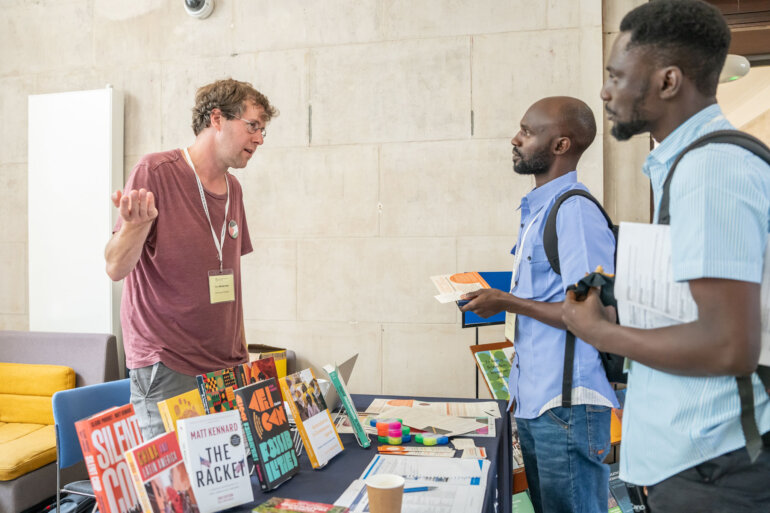Tips on publishing books & journals
Every year at the DSA conference we hold a popular session on publishing with tips from the editors and the chance for you to ask very specific questions. This year, we made a note of some of the top tips to share with everyone.
Getting an article in a development journal
David Fielding, Editor at the Journal of Development Studies, gives his four top tips for getting published in the journal and adds: “I have been rejected myself before I became an editor. There is no shame in that.”
- Don’t be discouraged. JDS receives 2000 submissions per year and they don’t have enough referees to send all those papers a review – so many are rejected without review.
- It’s obvious but your paper must relate to development studies, so it should be clear in the abstract and introduction how you are engaging with the development studies literature. You can be very involved in the details but you need to step back and look at what is connecting to the broader literature.
- JDS have no strong preference on methodology but the journal’s aspiration is for a mixed method approach. You must explain your methods and why you chose them.
- Writing style is very important: get your supervisor to read your article or get senior colleagues to feedback on the style of writing.
Top three tips from Ashild Kolas from the Journal of International Development.
- The abstract, title and keywords are your first impression to the editor so avoid being “desk-rejected” by not having this information clear.
- Pay attention to what debate in development studies you’re addressing. Make a unique contribution. Speak to development studies debates but don’t repeat what others are saying. Papers on the margin or connecting debates from one field to another could be interesting.
- Get an ORCID ID so that you’re verified as an author.
Book publishing

Bloomsbury
Nick Wolterman is the Development studies and African studies editor for Bloomsbury Publishing. His top three tips are:
- Have a conversation with Bloomsbury before you start on the book proposal form, because some publishers will have higher word counts or other differences.
- If you are thinking of using PhD thesis as a book, use the proposal form to say how you would transform the thesis into a book or send a redrafted chapter if you have it ready.
- Know that you will not make a lot of money publishing a book! But you will have better writing!
Find out more about Bloomsbury on their website or email [email protected]
Routledge / Taylor and Francis
Helena Hurd the editor focusing on development from Routledge / Taylor and Francis gives these five key tips with those seeking to write a book.
- Look at the publisher’s book proposal form which gets you to set out what the book is about and who for. This helps you get key information focused.
- The title is important to get right as it get people’s attention. It is also important for online searches.
- Know what the book is about and your reasons for writing it. Be able to pitch the book and what is its unique selling point. Ensure that the pitch is relevant for your audience, don’t make it try and fit everyone.
- Think about your desired format, the timeline of the book and where it sits within the wider readership. Look at current titles related to your book.
- Draft a table of contents so editors know what will be in the book and a draft chapter.
You can see Routledge’s global development books on the Routledge website or connect with Helena via X / Twitter. Also check out video tips from Routledge’s authors that they put together for DSA2020.
Oxford University Press
Adam Swallow is the Commissioning Editor for business and economics at Oxford University Press and says his favourite part of this job is finding out about great research and through the review process – and hopefully publication – being able to deliver this to the right readership. His top three tips were:
- Find a publisher that looks at development in a concentrated way – not just the occasional development title.
- Think: why do you want to publish a book and who do you want to read it? This helps you decide who to publish it. Why would you publish a book and not a journal or contributing to an edited volume?
- Walk into the biggest bookshop and look for where your book would be displayed. And see who is publishing in that area in the last year or two. Look at who you’re citing and recent in the books youre reading in a related topic.
Adam suggests to watch the video how to publish like an academic rock star, recorded at Blavatnik School of Government, and hosted on their Global Economic Governance Programme
You can also check out our video from DSA2023 on book and journal publishing strategies – but for a chance to meet all the publishers in one place and ask them questions, come to DSA2025!
